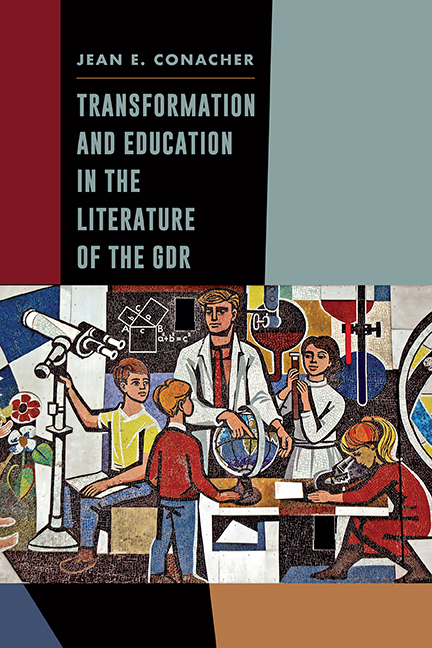Book contents
- Frontmatter
- Dedication
- Contents
- List of Illustrations
- Acknowledgments
- List of Abbreviations
- Introduction: The Postwar Desire for Renewal
- 1 Shaping the Cultural and Educational Landscape in the Soviet Occupation Zone (SBZ)
- 2 Interweaving GDR Education and Cultural Policy toward a National Literature
- 3 Critiquing the Norm in Steinmann' Die größere Liebe, Wolf' Der geteilte Himmel, and Kant' Die Aula
- 4 “Ich bin. Wer?“: Subjectivity and Transformation in Wolf' Nachdenken über Christa T. and Reimann' Franziska Linkerhand
- 5 “Wem geben wir Einsen … ?” Meritocracies and Reward in de Bruyn' Die Preisverleihung and Plenzdorf' Die neuen Leiden des jungen W.
- 6 “Mir geht es gut”: Challenging Stagnation in Hein' Der fremde Freund and H�ntsch' Wir sind keine Kinder mehr
- Conclusion
- Appendix A Text-Internal Functions of Narrative Triangle (Left Side)
- Appendix B Text-External Functions of Narrative Triangle (Right Side)
- Notes
- Bibliography
- Index
2 - Interweaving GDR Education and Cultural Policy toward a National Literature
Published online by Cambridge University Press: 25 March 2020
- Frontmatter
- Dedication
- Contents
- List of Illustrations
- Acknowledgments
- List of Abbreviations
- Introduction: The Postwar Desire for Renewal
- 1 Shaping the Cultural and Educational Landscape in the Soviet Occupation Zone (SBZ)
- 2 Interweaving GDR Education and Cultural Policy toward a National Literature
- 3 Critiquing the Norm in Steinmann' Die größere Liebe, Wolf' Der geteilte Himmel, and Kant' Die Aula
- 4 “Ich bin. Wer?“: Subjectivity and Transformation in Wolf' Nachdenken über Christa T. and Reimann' Franziska Linkerhand
- 5 “Wem geben wir Einsen … ?” Meritocracies and Reward in de Bruyn' Die Preisverleihung and Plenzdorf' Die neuen Leiden des jungen W.
- 6 “Mir geht es gut”: Challenging Stagnation in Hein' Der fremde Freund and H�ntsch' Wir sind keine Kinder mehr
- Conclusion
- Appendix A Text-Internal Functions of Narrative Triangle (Left Side)
- Appendix B Text-External Functions of Narrative Triangle (Right Side)
- Notes
- Bibliography
- Index
Summary
THE 1946 EDUCATION ACT, which provided the main educational framework for the SBZ, remained officially in place throughout the first decade of the GDR's existence. Modifications were largely ideologically and economically driven, designed to expand and upskill the workforce by enabling women to enter employment and providing alternative routes into higher education for students from a working or rural background. In parallel to cultural policy discussions, educational policy was widely debated in the period after the war, with Reformpädagogen playing a significant role in pursuing and shaping education reform in the early months. Indeed, as Benner and Sladek explain, the 1946 Education Act was largely received positively by many educational politicians and practitioners East and West as a direct result of such wide-ranging discussions on its formulation. Although the legislative framework remained unchanged for over a decade, a fundamental philosophical and pedagogical shift with far-reaching consequences took place when, from 1949 onward, the Central Committee (ZK) of the SED began promoting an interpretation of democratic education that placed the teacher at the forefront of future ideological directions: “die neue, demokratische Schule fordert den politisch bewußten und wissenschaftlich gebildeten Lehrer. Es ist deshalb notwendig, daß sich jeder Lehrer neben einer guten Allgemeinbildung eine objektive Kenntnis des Marxismus-Leninismus und gründliches Wissen in seinem Unterrichtsfach und in der Erziehungswissenschaft aneignet.”
The Fourth Pedagogical Congress held the same year saw any aspirations toward Reformpädagogik abandoned in favor of a Sowjetpädagogik that, as Gert Geißler explains, interpreted education as an instrument of social change; decried apolitical, child-centered learning as an abdication of the teacher's responsibility in building socialism; and drew strongly on the work of Soviet educationalists. Alexander Makarenko's theories on relationships between the individual and collective were particularly influential in reinforcing the new ideological approach: “Nur im Kollektiv … kann der neue Mensch geboren werden, und ein solches Kollektiv kann nur in der gesellschaftlich nützlichen Arbeit entstehen.” This abrupt and fundamental switch laid the political and pedagogical foundations for educational developments within the GDR in the coming decades: the compulsory eight-year schooling introduced by the original act was gradually extended, and a series of measures, paralleling—at times even presaging—changes in broader government policy ensured this transition toward a more socialist interpretation of schooling established a pattern whereby later education acts often simply consolidated existing practice into legislation.
- Type
- Chapter
- Information
- Publisher: Boydell & BrewerPrint publication year: 2020

